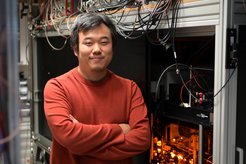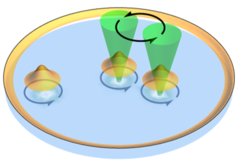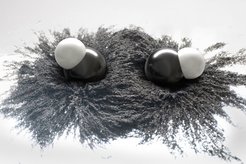Xinyu Luo receives ERC Consolidator Grant
With the funding, the researchers take on one of the central challenges of modern physics today – the creation and investigation of unconventional superfluids.
On the 1st of May 2024, a new independent research group “ultracold lithium-rubidium molecules” has started at MPQ. Dr. Xinyu Luo, research group leader in the quantum many body division, has been awarded the renowned ERC Consolidator Grant of two million Euros. With these funds, he aims to create a new species of polar molecules at unprecedented low temperatures, just a few nanokelvins above absolute zero. These fermionic molecules can pair up in a spinning motion and move together without resistance, forming so-called p-wave superfluids – matter that flows frictionless – and even a Bose-Einstein condensate of tetratomic supermolecules when the dipolar attraction is strong enough. Both are exotic quantum matters that scientists have long been seeking for. These results might eventually help to realize fault-tolerant quantum computing using ultracold molecules. Moreover, they could shed light on a few long-standing mysteries in physics, such as understanding the behavior of helium-3 superfluids, unraveling the secrets of high-temperature superconductors, and even exploring how neutron stars evolve.

What could helium-3 superfluids, high-temperature superconductors, and the cores of neutron stars have in common, despite their vast differences in temperature, density, and constituent? They are (or are predicted to be) all superfluids composed of fermion particles with half-integer spin. In particular, fermions in those superfluids pair up with nonzero angular momentum, a feature distinct from the s-wave (zero angular momentum) pairing in conventional superconductors. These exotic superfluids are often complex, such as in high-temperature superconductors, and some, like those in neutron stars light-years away, cannot be studied experimentally, leaving many mysteries unresolved. Understanding these superfluids is one of the core challenges in modern physics.

One way to unravel the mysteries of those unconventional superfluids is to realize them with ultracold polar molecules. Polar molecules have uneven charge distributions and behave like tiny magnets through dipolar interactions. At sufficiently low temperatures, they can pair up in a spinning motion to form p-wave superfluids, which result from the pairing of fermions exhibiting dumbbell-shaped angular symmetry. The advantages of molecules lie in their highly tunable interactions controlled by microwave electric fields and their simplicity. This allows the researchers to realize p-wave superfluidity with minimal elements and, thereby, to capture and verify their essential physical mechanisms. Insights gained from such simple and highly controllable quantum simulators can, in turn, help us understand and design more complex superfluids. Some of those exotic superfluids can support topologically non-trivial states that are robust against disturbances, thereby can potentially be used to implement fault-tolerant quantum computing.
The biggest challenge to realizing dipolar superfluid of molecules is the efficient cooling of polar molecules, which is so far limited by the small number of molecules and relatively short lifetimes. The key is to first produce a large sample of molecules with a large electric dipole moment. The lithium and rubidium combination offers the potential to produce unprecedentedly large samples of molecules, as well as orders of magnitude longer lifetimes compared to existing fermionic polar molecules. These factors make lithium-rubidium molecules an ideal platform for realizing and exploring p-wave superfluidity.

“Creating a new species of polar molecules, however, is an incredibly complex task with a high risk. The behavior of a p-wave superfluid with strong dipolar interactions might also be well beyond imagination, not to mention a Bose-Einstein condensate of tetratomic supermolecules. The ERC Consolidator Grant is very important for us to carry out this high-risk and high-gain research project. Fortunately, we have already realized several equally ambitious forefront research projects in the area, which we can harness now" says Dr Xinyu Luo, Principal Investigator of the project. He and his team attained a series of scientific breakthroughs in recent years, including the first degenerate Fermi gas of sodium-potassium molecules, universal scattering resonances of polar molecules, and ultracold tetratomic supermolecules, which have been published in high-ranking scientific journals.
“In the new lab, we will develop a compact and flexible dual-species/polar molecule setup using new technologies, in order to reduce the complexity and barriers of implementing ultracold polar-molecule experiments. Looking to the future, this might be the first step towards a practical quantum computer based on ultracold polar molecules.” added Dr. Xinyu Luo.
The new research group has open positions for Master’s students, doctoral candidates, and a postdoctoral researcher. Applicants can contact Dr. Xinyu Luo directly via mail.














